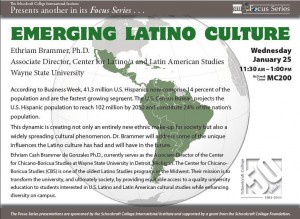Two Reflections on Pedagogy
 I attended Dr. Ethriam Brammer’s presentation on “Emerging Latino Culture” which was part of the Focus Series. It was an engaging presentation; one of the best I have attended.
I attended Dr. Ethriam Brammer’s presentation on “Emerging Latino Culture” which was part of the Focus Series. It was an engaging presentation; one of the best I have attended.
It was especially fascinating to watch Dr. Brammer hold the students attend while he lectured on etymology. Not only was his presentation style effective, but his history was also solid.
One thing that Dr. Brammer employed was the K-W-L formula; a pedagogical approach I had not heard described in such a simple way. K-W-L begins by assessing what learners already Knows about the subject. Learners are then asked What they want to learn more about. Finally, learners are asked what they Learned. It was an effective way to develop his presentation. Telling the audience what he planned to do also helped. The approach allowed him to get the audience interacting with each other and then with him.
My early American history students received much more direct history instruction that I expected they would have received by attending “Emerging Latino Culture.”
Over all, a very good experience.
One of the things that is especially important for me is for students to take responsibility for the class; to not look to me for all of the answers and direction. This does not mean that my role is unimportant. As I wrote to my ENG 102 students:
As I warned during yesterday’s class, the biggest mistake that students make in my classes is to decide that they do not need to attend library days or to stay in contact with me. Although I pride myself in how little I teach in the traditional sense, you cannot pass the class without me. But if you meet with me during our library days and follow my directions, you should not have to worry about the research requirements for the course.
During class yesterday, I pointed out that they did not currently have the skills to successfully complete the research and writing required this semester. I also pointed out that what they did not have in the library during library days was easy access to me and to the reference librarian.
Given the nature of the course, I am generally unable to accurately predict what the next step in a student’s research process will be until they complete the current one. I will ask a student to do something (e.g. consult the reference librarian, do a specific type of search, et cetera) and then report back to me. I then give them the next step based on the results on which they report. Often, several steps can be taken during one class period–if the student is present.
In the past, a student will leave the library after they have their next step because they know what they need to do. What they don’t factor into the decision is that the step sometimes only takes five or ten minutes. If they don’t report back to me until the next class period, they have set up a cycle that will cause them to fall further and further behind in the course.
- –Steven L. Berg, PhD
LEAVE A COMMENT